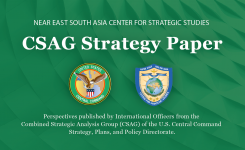- Partnership for Peace Consortium of Defense Aca...
- PfPC Products
- Georgia and Ukraine in the Kremlin’s Policy
Georgia and Ukraine in the Kremlin’s Policy
Connections: The Quarterly Journal 17, no. 1 (2018): 43-59
0 comments
By Malina Kaszuba
March 1, 2018, PfP Consortium
The Russian Federation believes that the post-Soviet region is strategically important and considers it to be the exclusive zone of its influence. Each of the former republics occupies a specific place in its foreign and security policy. In the following article the author has made an attempt to determine the place of Georgia and Ukraine in the aforementioned pol¬icy. It was made by analyzing Moscow’s policy towards them, including actions that clearly enabled the implementation of a strategic political turn towards the West, which for the Kremlin would mean a gradual loss of in-fluence in the area of the former USSR.

